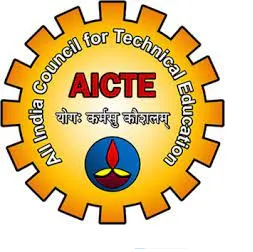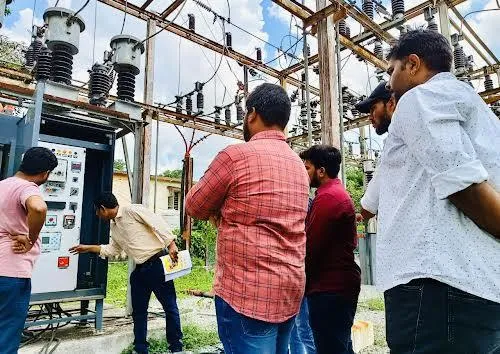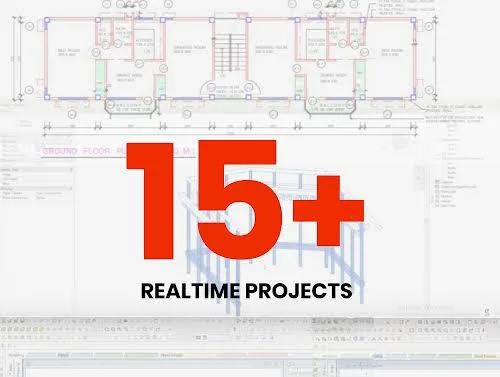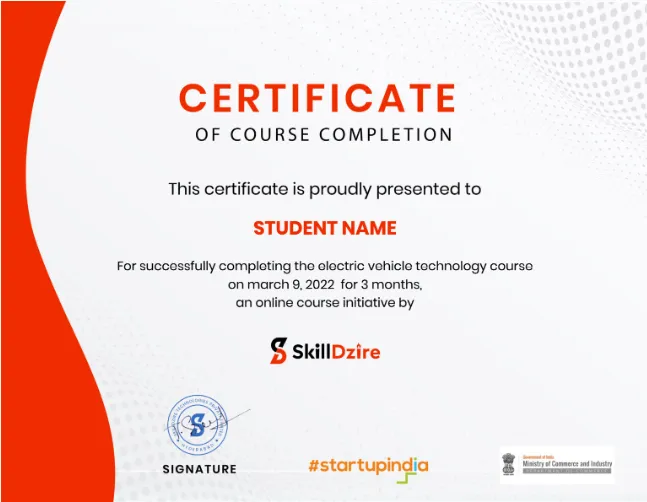3 Months Certification on Electrical System Design
Join our Job-Oriented Program 🚀🚀

Explore Real time Electrical Skills
3 Months Certified On Electric System Design
5000+ students trained
Learn Electrical with more excitement
Get Personalised Placement Support
Get into Hidden Job market & land your dream job
Registration
Recognised By



Opportuities for Electrical Engineers
Companies
Power Pants
Industries
Faciltities
Substation and Tr lines
Product based companies / EV / Switchgear...
Designations
Design Engineer
Site Engineer
Maintenance Engineer
Testing and commissioning Engineer
Sales/Tendering/Procurement ....
Course Outline
Module 1: Basics of Electrical Engineering and Power Factor Correction
- Introduction to the Industry and its Electrical System Requirements. - Roles, Responsibilities, and Importance of Electrical Engineers. - Important Electrical Parameters and Definitions. - Power Factor Correction and Improvement Methods. - Various Design Stages & Sequence of Electrical Design Procedure.
Module 2: Switchgear Components Selection
- Circuit Breaker Selection and Sizing. - Instrument Transformer Selection and Sizing. - Relay Selection and Sizing.
Module 3: Substation Design and Earthing Concepts
- Introduction and Types of Substations. - Selection and Sizing of Equipment. - Bus Bar Arrangements. - Substation Clearances. - SLD (Single Line Diagram) and Layout Preparation for 132/33kV Substation.
Module 4: Switchgear Panel Design
- Basic Introduction. - MCC (Motor Control Center), PCC (Power Control Center) Panels. - APFC (Automatic Power Factor Correction) Panel. - Distribution Boards. - Types of Starters (DOL, Star Delta, VFD & Soft Starter). - Typical Control Schematics for DOL, Star/Delta/VFD/Soft Starter. - Typical Schematics for Power Feeder..
Module 5: Electrical Equipment Selection and Sizing Calculations
- Cable Selection and Sizing. - Short Circuit Calculation. - Transformer selection and Sizing - Battery Selection and Sizing. - UPS (Uninterruptible Power Supply) Selection. - Generator Selection.
Module 6: Internal Electrical Design
- Electrical Layout in Residential Building Using AutoCAD. - Selection of House Wiring. - Sizing and Selection of Conduit. - Sizing and Selection of Switch Socket. - Calculation of Load on Circuit. - Design of Sub-Circuit (Lighting Circuit and Power Circuit). - Distribution of Power Circuit. - Calculation of Fan Requirements. - Calculation of Earthing for Residential Buildings. - Sizing and Selection of Low Voltage Switchgears (MCB, MCCB, RCB, RCBO, MPCB).
Module 7: Illumination Design
- Introduction to Illumination. - Types of Lighting Fixtures. - Preparation of Fixture Schedule. - Indoor Illumination Calculation. - Outdoor Illumination Calculation. - Calculation Using Dialux Software. - Lighting Layout Design. - Lighting Installation Details. - Small Power Selection. - Lighting Board Schedule.
Module 8: Solar Plant Design
- Overview of Solar System. - PV (Photovoltaic) System Components Selection. - Rooftop PV Plant Design. - Utility Scale Design. - Software Training. - BOQ (Bill of Quantities) and DPR (Detailed Project Report) Preparation.
Module 9: Software Training
- AutoCAD. - PVsyst. - Sketchup.
Time is Running out. Grab your seat fast !!!
Who is this Program for ?
Recent engineering graduates aiming for roles in the Electrical core domain
Pursuing engineering students eager to enhance their electrical expertise
Individuals passionate about establishing a thriving career in Electrical Engineering
Those in search of structured learning to secure a job with a substantial salary increase of over 80%.

Realtime skills
90 Days Intensive Electrical Design Online Course & Live Projects with industry experts.

Hands on projects using
1. AutoCAD 2. PVsyst
3. SketchUp 3. DIALux etc.

Industry-Ready Certification
Improve your credibility &
Gets you placed with higher salaries.
Meet your Trainer

Sreedhar Thokala
16+ Years of Industry - Academia Experience
Electrical and Renewable Systems
Why you should enroll
Real-World Insights: Unlike college, where we miss industry insights, this course connects us with real professionals, offering practical knowledge vital for our careers
Experienced Mentors: Learning from industry experts, not just theoretical professors, gives us a solid understanding that textbooks often lack.
Career Clarity: Exploring job roles, company dynamics, and career paths helps us make informed decisions about our future, something rarely discussed elsewhere
Industry Relevance: Tailoring our learning to what companies actually need ensures we're job-ready, aligning our skills with industry demands right from the start
Frequently Asked Questions
What is the duration of the electrical job-oriented course?
The duration of the electrical job-oriented course is 90 days, with daily sessions lasting 1.5 hours each.
Are there any specific eligibility criteria for enrolling in the course?
The eligibility criteria for enrolling in the course require completion of diploma/engineering/masters in Electrical Engineering
What is the difference between a job-oriented course and a traditional degree in electrical engineering?
• Job-oriented courses prioritize immediate application and real-world understanding.
• These courses focus on practical aspects, bridging the gap between theory and hands-on application.
• Students learn to comprehend electrical systems in real-time scenarios, ensuring practical skills.
• Graduates are equipped with job-specific skills, making them job-ready for industry roles.
• Traditional degrees offer a broader theoretical foundation, lacking the immediate, real-world focus of job-oriented courses
Can I enroll in Electrical JOC during my 3rd or final year of engineering studies?
Certainly, enrolling during your final years allows time to explore interests, companies, and secure a job before graduation, maximizing campus opportunities
What kind of projects will I be working on during the course?
During the course, you'll work on diverse projects, as concepts are thoroughly explained through practical applications, offering exposure to multiple project scenarios
What is the class schedule like? Is it flexible for working professionals?
The class schedule primarily accommodates evenings, offering flexibility for working professionals. Additionally, recorded sessions are available for convenient access.
Can I get access to course materials and lectures after completing the course?
Certainly, you will have access to course materials and recorded lectures for one year after completing the course, ensuring continued learning and review
What kind of job placement assistance does the institute provide?
• The placement process starts 30 days after the sessions begin.
• Resume workshops, LinkedIn guidance, job board strategies, and mock interviews are available to support participants
• Dedicated sessions on career opportunities and market scenarios help students gain clarity in choosing specific fields or designations in electrical engineering.
• Interviews with companies are scheduled, and personalized grooming sessions are conducted to enhance student preparedness.
• Success rate: 95% with 95 out of 100 participants securing placements.
Can I switch my career to a different field after completing this course?
Certainly, after completing this course, you can explore transitioning to a different field. The career guidance session will provide detailed insights into available fields, the switching process, company expectations, and related discussions
Are there any practical training sessions held in real industrial environments?
There are no hands-on or direct site visits since it's an online course. However, the presentations incorporate numerous videos and photos from real-time projects, ensuring an immersive learning experience
Will I have the opportunity to interact with industry professionals during the course?
Certainly, a dedicated mentor will be assigned to assist you in understanding concepts and problem-solving. They will facilitate connections with industry professionals for enhanced clarity during the course
What is the overall success rate of students who have completed this course in terms of finding employment?
The employment success rate after completing this course is 95 out of 100. The remaining 5 individuals might have personal reasons for not pursuing a career in Electrical Engineering. We are committed to facilitating placements for all our students
What are the typical locations where jobs are available after completing an Electrical Job-Oriented Course (JOC)?
The primary focus is to empower our students to independently navigate the job market, fostering market awareness before they graduate. We offer significant support in Hyderabad, and while our main network is in Hyderabad, we also have connections in Bengaluru, Chennai, and Pune. Rest assured, we assist every student in securing their preferred job location
What are the core engineering job roles that are suitable for women?
In today's environment, women are interested in various roles. While their choices are diverse, the majority lean towards office-based positions such as design engineer, procurement engineer, project management, sales engineer, or tendering engineer
What is the registration procedure for a Job-Oriented Course (JOC), and when does the next course session begin?
To register for a Job-Oriented Course (JOC), simply express your interest via Sign-up and WhatsApp. We will promptly call you, discuss the upcoming course dates, and assist you with the onboarding process